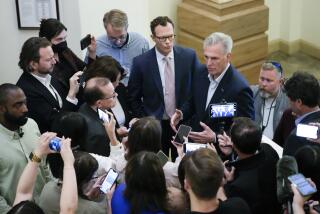Way Past the Warning Stage
- Share via
Old-timers used to talk about whacking a mule over the head with a 2-by-4 to get its attention. But what does it take to convince President Reagan and Congress that they must get serious about negotiating a budget-deficit agreement?
One would think that Tuesday’s 50-point drop in the stock market, followed by another 18 points on Wednesday, would convince them that the crisis is not over and that American economic life has not slipped back into business as usual.
Certainly the results of a Los Angeles Times Poll on consumer spending should alarm Washington. The poll, published in Wednesday editions, indicated that nearly one out of three Americans intends to postpone purchase of a major item, such as a house or automobile, during the next 12 months. A substantial slackening of consumer spending is certain to lead the nation into recession. More than half the 2,463 persons sampled had increased fears about the future of the economy since Oct. 19.
Then there was an article by Francis M. Bator, a respected Harvard economist, who said the odds on a recession in 1988-89 have increased substantially and that “in a debt-ridden world, the consequences could be devastating.”
Or if anyone had really been paying attention, they would have heard the stark warning of former Commerce Secretary Peter G. Peterson in a 22-page article in the October issue of Atlantic Monthly magazine. In depressing but compelling detail, Peterson lays out the grim economic choices facing the nation, both now and for years to come. He observed that “Americans are about to wake up to reality: For some time now the foundations of their economic future have been insidiously weakening.” Peterson’s article was in print before the stock market disaster of mid-October.
In Washington, each side was blaming the other for the lack of progress in the second week of budget talks, convened after the President called for a bipartisan effort to demonstrate Washington’s determination to act. The President did not help matters Wednesday by reverting to his shopworn and erroneous charge that congressional Democrats alone are to blame for “all those deficits,” or by refusing to participate directly in the talks.
The nation must not rush into stringent fiscal policy in the face of a possible recession. But expectations have been raised for an agreement that reduces the deficit by at least $23 billion through a combination of spending reductions and tax increases. Such an agreement will not solve much, but it is essential in preventing further panic by Wall Street and U.S. trade partners.
Applying a token fix to the 1988 budget is just the start, however, and perhaps the easiest part. Charting the economy through the coming years is going to require diligence, discipline and tough choices. Respected officials already are calling for national commissions on the deficit and economy. The 1988 presidential candidates need to address these issues.
But most importantly, Congress and the President must keep their attention on the perilous economic situation. It may not hurt to keep a large stockpile of 2-by-4s handy.
More to Read
Get the L.A. Times Politics newsletter
Deeply reported insights into legislation, politics and policy from Sacramento, Washington and beyond. In your inbox twice per week.
You may occasionally receive promotional content from the Los Angeles Times.










